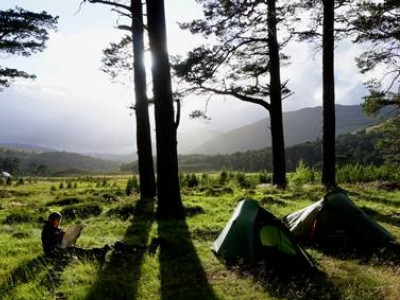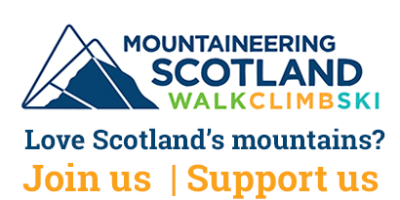
1. Mountaineering Scotland and the mountaineering community are concerned about reports in the past few years from across Scotland, of groups of informal campers whose anti-social behaviour and littering threatens to undermine the activities of the many people who enjoy camping responsibly - both by the roadside and in the remote mountains - in keeping with the Scottish access legislation and guidance.
2. There is also concern about the term ‘wild camping’ being applied to all camping activity outside of formal campsites, including overnighting in vehicles and motorhome touring. This broad labelling of a range of activities causes confusion in the reports of informal camping activity, where there have been calls by some communities and local politicians to regulate ‘wild camping’ with no-wild-camp zones, byelaws, and permits, when the problem is more one of vehicle management.
3. Complaints of congestion caused by campervans and motorhomes, damage to road verges and problems of waste disposal, along with images of abandoned camping kit, litter and human waste are used in various media platforms to illustrate problems, and this negative association with wild camping can colour public perceptions.
Photo by Martha Koerner
4. There is a long history of informal camping in Scotland and the Land Reform (Scotland) Act 2003 establishes a statutory right of access to land for recreational purposes, with the Scottish Outdoor Access Code including wild camping as an activity coming under these access rights.
5. Camping by tent or bivvy may be done on land wherever the right of access applies. SOAC defines wild camping as lightweight camping, done in small numbers for up to two or three nights in any one place. Problems can be avoided by not camping in enclosed fields of crops or farm animals and by keeping well away from buildings, roads and historic structures.
6. Camping behaviour that is anti-social and involving noise, littering, waste or environmental damage, behaviours that contravene other legislation, is not included under access rights.
7. It is important to understand that the right of access only applies to non-motorised users, including pedestrians, cyclists and horse riders. It does not extend to vehicles, such as cars, campervans and motorhomes, which are covered by Road Traffic Acts and associated regulations.
8. Wild camping will continue to be done by people in Scotland, and is an enjoyable activity when done considerately. We do not condone anti-social behaviour or environmental damage.
9. We do not support calls for restrictions to where wild camping may be done as this is not an effective way to tackle the problems of anti-social camping in some parts of rural Scotland. We believe that the problem with wild camping is the behaviour of some, not the activity of camping itself.
10. People new to wild camping may need helpful advice on how to do the right thing; it is a learned activity and encouragement of individual campers will assist them to camp responsibly.
11. There is existing legislation designed to deal with irresponsible and criminal behaviour, which requires coordination of resources to deal with local situations as they arise.
12. Creating new powers to restrict wild camping in Scotland is potentially more expensive than using the existing legislation and would face similar problems with resourcing proper monitoring and enforcement. Considerate campers would suffer, while rural communities would be no further forward.
13. There would be benefit in encouraging Local Authorities and other agencies and organisations to work together with local communities and landowners to share ideas and resources, to develop local solutions in different areas to tackle specific vehicular tourism facilities and infrastructure needs, and address localised camping problems.
14. We will promote access rights and responsible behaviour for all through our communications and campaigns. We will specifically provide guidance on wild camping for those that may benefit from it, though a Considerate Camping media campaign.
15. The time is right to bring to the National Access Forum a call for a national public information broadcasting campaign to remind people about their access rights and responsibilities, including the impact that irresponsible camping has on local people and the environment.
16. There is a need, not for powers to restrict informal camping, but for facilities and infrastructure to manage vehicle tourism and associated camping in the summer months. This is best done through local partnerships of authorities, agencies and local communities and landowners working together to develop solutions.
17. The right to wild camp is not an excuse for anti-social or illegal behaviour. Existing laws and regulations should be monitored and enforced, and resources allocated to enable this.
Approved by Board of Directors
4th September 2020

Mountaineering Scotland campaigns on behalf of Scotland's hill walkers, climbers, mountaineers and ski tourers, with over 16,000 members from all walks of life.
Membership of Mountaineering Scotland supports the work we do, from campaigning and protecting mountain landscapes and access, to promoting skills, responsible access and self-reliance for those who visit Scotland's hills, crags and climbing walls.
Membership is excellent value at less than £3 a month for adults, and includes public and civil liability insurance, a range of member discounts and offers, access to great value mountain skills courses, Scottish Mountaineer magazine and more. Read more about our membership benefits.